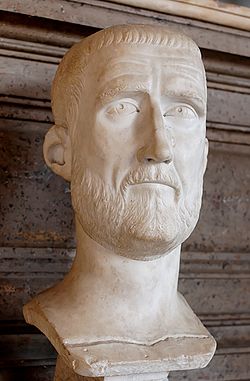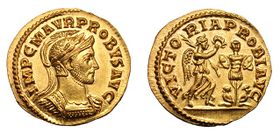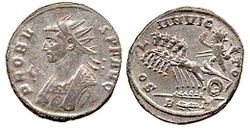Probus
| Probus | |
|---|---|
| Emperor of the Roman Empire | |
 |
|
| Bust of Probus | |
| Reign | 276 – September/October, 282 |
| Full name | Marcus Aurelius Probus (from birth to accession); Caesar Marcus Aurelius Probus Augustus (as emperor) |
| Born | c. August 19, 232 |
| Birthplace | Sirmium |
| Died | September/October, 282 (aged 50) |
| Place of death | Sirmium |
| Predecessor | Florianus |
| Successor | Carus |
Marcus Aurelius Probus (c. 19 August 232 – September/October 282), commonly known as Probus, was Roman Emperor from 276 to 282. During his reign, the Rhine and Danube frontier was strengthened after successful wars against several Germanic tribes such as the Goths, Alamanni, Longiones, Franks, Burgundians, and Vandals.
Contents |
Life


Born in 232 in Sirmium, Pannonia, Probus entered the army around 250 upon reaching adulthood. He distinguished himself under the emperors Valerian, Aurelian and Tacitus. He was appointed governor of the east by Tacitus, whose death in 276 prompted Probus' soldiers to proclaim him emperor.
Florianus, the half-brother of Tacitus, was also proclaimed successor by his soldiers, but was killed after an indecisive campaign. Probus travelled west, defeating the Goths along the lower Danube in 277 - acquiring the title of Gothicus. His position as emperor was ratified by the Senate around this time.
In 278, Probus campaigned successfully in Gaul against the Alamanni and Longiones; both tribes had advanced through the Neckar valley and across the Rhine into Roman territory. Meanwhile, his generals defeated the Franks and of these operations were directed to clearing Gaul of German invaders (Franks, and Burgundians), allowing Probus to adopt the titles of Gothicus Maximus and Germanicus Maximus. One of his principles was never to allow the soldiers to be idle, and to employ them in time of peace on useful works, such as the planting of vineyards in Gaul, Pannonia and other districts, in order to restart the economy in these devastated lands.
In 279–280, Probus was, according to Zosimus, in Raetia, Illyricum and Lycia, where he fought the Vandals. In the same years, Probus' generals defeated the Blemmyes in Egypt; Probus ordered the reconstruction of bridges and canals along the Nile, where the production of grain for the Empire was centered.
In 280–281, Probus had also put down three usurpers, Julius Saturninus, Proculus and Bonosus. The extent of these revolts is not clear, but there are clues that they were not just local problems[1]. In 281, the emperor was in Rome, where he celebrated his triumph.
Probus was eager to start his eastern campaign, delayed by the revolts in the west. He left Rome in 282, moving first towards Sirmium, his birth city, when the news that Marcus Aurelius Carus, commander of the Praetorian Guard, had been proclaimed emperor reached him. Probus sent some troops against the new usurper, but when those troops changed sides and supported Carus, Probus's soldiers then assassinated him (September/October 282).
Notes
References
Primary Sources
- Aurelius Victor, Epitome de Caesaribus
- Eutropius, Breviarium ab urbe condita
- Historia Augusta, Life of Probus
- Joannes Zonaras, Compendium of History extract: Zonaras: Alexander Severus to Diocletian: 222–284
- Zosimus, Historia Nova
Secondary Sources
- Mc Mahon, Robin, "Probus (276–282 A.D.) and Rival Claimants (Proculus, Bonosus, and Saturninus) of the 280s", DIR
 This article incorporates text from a publication now in the public domain: Chisholm, Hugh, ed (1911). Encyclopædia Britannica (Eleventh ed.). Cambridge University Press.
This article incorporates text from a publication now in the public domain: Chisholm, Hugh, ed (1911). Encyclopædia Britannica (Eleventh ed.). Cambridge University Press.- Probus Marcus Aurelius
External links
- Probus, article at NumisWiki
 "Marcus Aurelius Probus". Catholic Encyclopedia. New York: Robert Appleton Company. 1913.
"Marcus Aurelius Probus". Catholic Encyclopedia. New York: Robert Appleton Company. 1913.
| Regnal titles | ||
|---|---|---|
| Preceded by Florianus |
Roman Emperor 276–282 |
Succeeded by Carus |
| Political offices | ||
| Preceded by Marcus Claudius Tacitus , Aemilianus |
Consul of the Roman Empire 277–279 with Paulinus, Virius Lupus, Nonnius Paternus |
Succeeded by Lucius Valerius Messalla, Gratus |
| Preceded by Lucius Valerius Messalla, Gratus |
Consul of the Roman Empire 281–282 with Gaius Junius Tiberianus, Victorinus |
Succeeded by Carus, Carinus |
|
|||||||||||||||||||||||